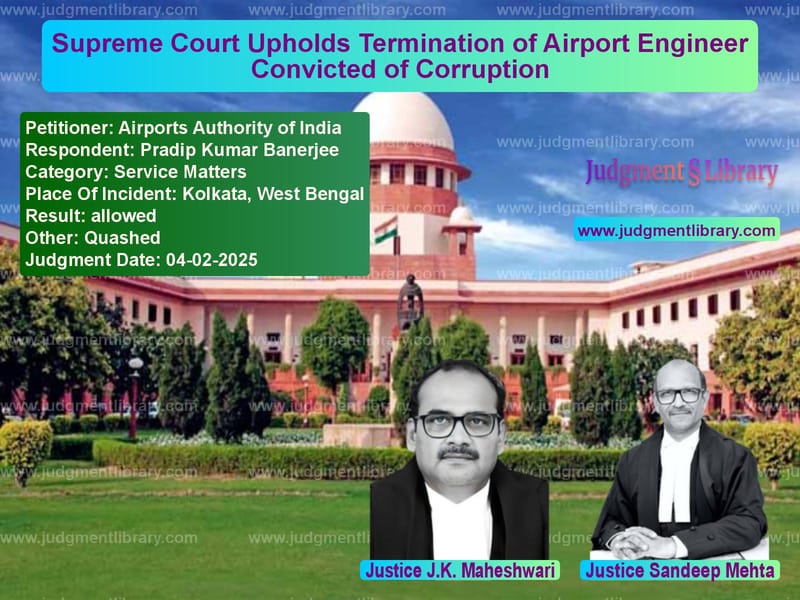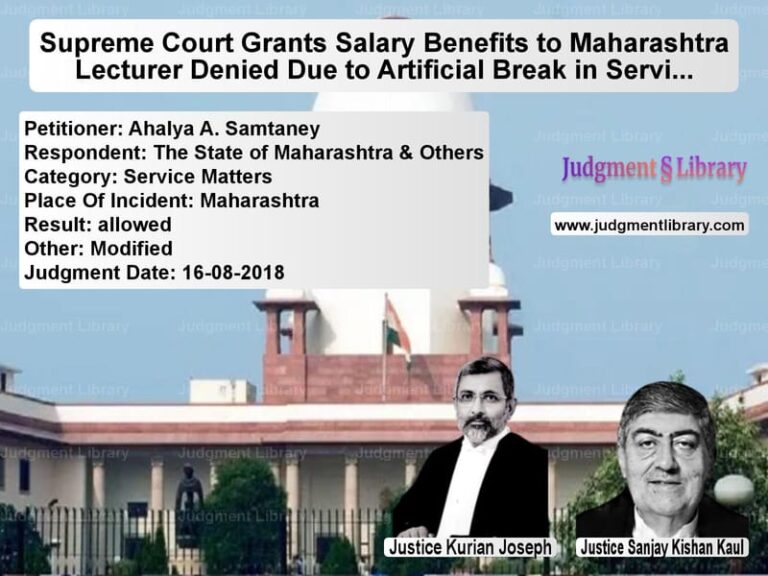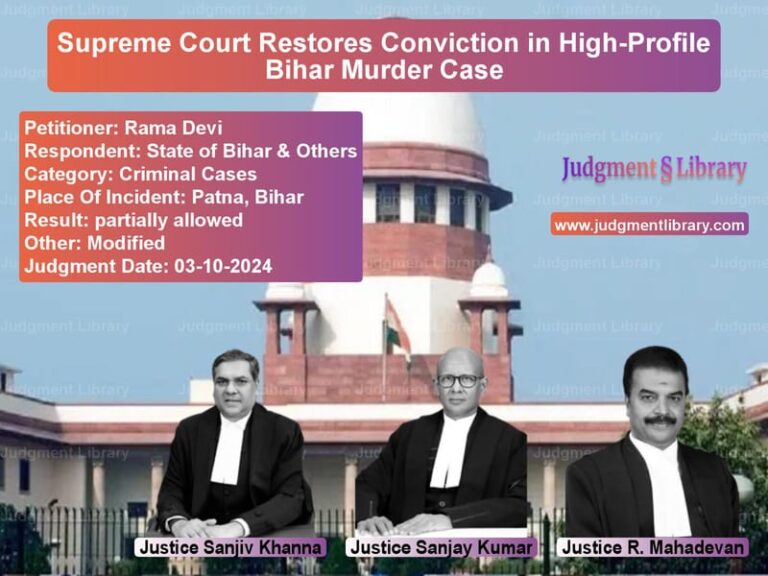Supreme Court Upholds Termination of Airport Engineer Convicted of Corruption
The Supreme Court of India in Airports Authority of India vs. Pradip Kumar Banerjee upheld the termination of an Assistant Engineer convicted under the Prevention of Corruption Act. The case primarily addressed the validity of dismissal from service following a criminal conviction and the implications of an acquittal on appeal.
Background of the Case
The respondent, Pradip Kumar Banerjee, was employed as an Assistant Engineer (Civil) with the Airports Authority of India (AAI). He was arrested along with a Junior Engineer for allegedly demanding and accepting a bribe from a contractor.
The timeline of events:
- 1993: The CBI registered a case against the respondent under Sections 7, 13(2), and 13(1)(d) of the Prevention of Corruption Act, 1988, along with Section 34 of the IPC.
- 1999: The Special CBI Court convicted him.
- 2000: The Disciplinary Authority dismissed him from service without holding a departmental inquiry, citing the conviction.
- 2004: The High Court set aside his conviction, granting him the benefit of doubt.
- 2005: Following his acquittal, Banerjee sought reinstatement.
- 2005-2011: Multiple rounds of litigation ensued, with AAI initiating a fresh departmental inquiry.
- 2012: The High Court’s Division Bench reinstated him, setting aside the disciplinary action.
- 2025: The Supreme Court overturned the High Court ruling and upheld his dismissal.
Petitioner’s Arguments (AAI)
The Airports Authority of India contended:
- A criminal acquittal does not automatically lead to reinstatement in service.
- The High Court erred in interfering with the Disciplinary Authority’s decision.
- Banerjee’s acquittal was not on merit but on a technicality—lack of sufficient evidence.
- The standard of proof in a departmental inquiry is lower than in a criminal trial.
The petitioner’s counsel argued:
“Merely securing an acquittal does not entitle an employee to reinstatement, particularly when the dismissal was based on a legally conducted disciplinary inquiry.”
Respondent’s Arguments (Pradip Kumar Banerjee)
The respondent contended:
- The disciplinary inquiry was tainted with bias and lacked procedural fairness.
- The complainant was not examined in the inquiry, weakening the case against him.
- The disciplinary action should not have been conducted after he was cleared of criminal charges.
The respondent’s counsel argued:
“Once a court of law has acquitted the accused, continuing a departmental inquiry on the same allegations is unjust and amounts to double jeopardy.”
Supreme Court’s Observations
The Supreme Court analyzed the principles governing disciplinary proceedings and their distinction from criminal trials.
Key observations:
- The standard of proof in disciplinary inquiries is based on the preponderance of probabilities, whereas criminal trials require proof beyond a reasonable doubt.
- The High Court overstepped its jurisdiction by re-evaluating evidence in an intra-court writ appeal.
- Banerjee’s acquittal was not an honorable exoneration but rather a benefit of the doubt due to lack of evidence.
- The complainant’s non-examination in the disciplinary inquiry was not fatal to the proceedings.
The Court ruled:
“An acquittal in a criminal trial does not automatically negate an employer’s right to take disciplinary action based on internal findings of misconduct.”
Final Judgment
The Supreme Court:
- Set aside the High Court’s ruling.
- Upheld Banerjee’s dismissal from service.
- Clarified that departmental inquiries can proceed independently of criminal trials.
The Court concluded:
“Public institutions must have the authority to enforce discipline and remove employees found guilty of corruption, irrespective of criminal court verdicts based on technicalities.”
Conclusion
This ruling establishes clear legal principles:
- Departmental inquiries operate under a different standard of proof than criminal trials.
- An acquittal does not guarantee reinstatement if misconduct is proven in an internal inquiry.
- Courts should not interfere in employer disciplinary decisions unless due process is clearly violated.
- Government institutions have a duty to maintain integrity and remove corrupt officials.
The Supreme Court’s decision reinforces the importance of ensuring public sector integrity while respecting due process.
Petitioner Name: Airports Authority of India.Respondent Name: Pradip Kumar Banerjee.Judgment By: Justice J.K. Maheshwari, Justice Sandeep Mehta.Place Of Incident: Kolkata, West Bengal.Judgment Date: 04-02-2025.
Don’t miss out on the full details! Download the complete judgment in PDF format below and gain valuable insights instantly!
Download Judgment: airports-authority-o-vs-pradip-kumar-banerje-supreme-court-of-india-judgment-dated-04-02-2025.pdf
Directly Download Judgment: Directly download this Judgment
See all petitions in Employment Disputes
See all petitions in Termination Cases
See all petitions in Disciplinary Proceedings
See all petitions in Public Sector Employees
See all petitions in Judgment by J.K. Maheshwari
See all petitions in Judgment by Sandeep Mehta
See all petitions in allowed
See all petitions in Quashed
See all petitions in supreme court of India judgments February 2025
See all petitions in 2025 judgments
See all posts in Service Matters Category
See all allowed petitions in Service Matters Category
See all Dismissed petitions in Service Matters Category
See all partially allowed petitions in Service Matters Category







